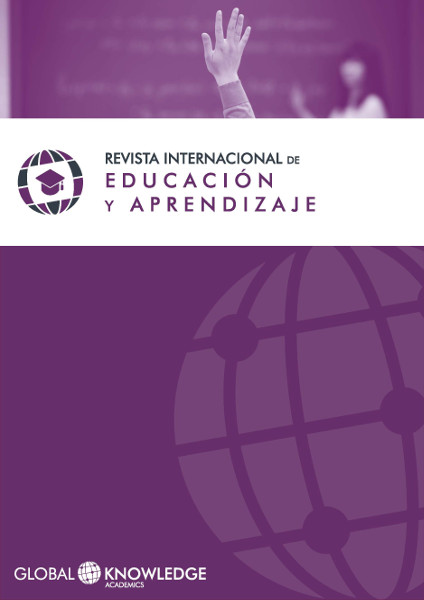Technological Literacy: A Successful Experience
DOI:
https://doi.org/10.37467/gka-revedu.v4.690Keywords:
Technological Literacy, Adult, Technology, Digital GapAbstract
The generation, dissemination and access to knowledge dynamic that brings the constant technology evolution has brought new challenges and a larger separation between those sections of the population that have access to those tools and those that are far from these, the Technological Literacy represents a way to reduce the digital gap and thus promote inclusion. In this article the experience of the Technological Institute of Sonora in northwestern Mexico has had with adult literacy is disclosed, describing their background, context and methodology.
Downloads
Global Statistics ℹ️
|
1044
Views
|
1354
Downloads
|
|
2398
Total
|
|
References
Aldana, G., García, L. y Jacobo, A. (2012, enero-junio). Las Tecnologías de la Información y Comunicación (TIC) como alternativa para la estimulación de los procesos cognitivos en la vejez. CPU-e, Revista de Investigación Educativa 14, 153-166. Recuperado de http://www.uv.mx/cpue/num14/practica/aldana_garcia_mata_tic_vejez.html DOI: https://doi.org/10.25009/cpue.v0i14.34
Alles, M. (2007). Dirección estratégica de recursos humanos: gestión por competencias. Argentina: Granica.
Angulo, J., Mortis, S., Pizá, R., y Ochoa J. (Noviembre, 2008). Alfabetización Tecnológica: Una alternativa para disminuir la brecha digital. Foro Internacional de Derechos Humanos y Tecnologías de la Información y Comunicación (TIC) en la educación. Recuperado de http://www.repositoriodigital.ipn.mx/bitstream/handle/123456789/3529/4.pdf?sequence=1
Angulo, J., Ochoa, J., Mortis, S., Valdivia, E., Pizá, R., y López, G. (2009). Alfabetización Tecnológica y el cierre de la brecha digital. En J. Ochoa, S. Mortis, L. Márques, A. Valdés y J. Angulo (Eds.), Apuntes y aportaciones de proyectos e investigaciones en educación (pp. 81-90). México: ITSON.
Consejo Nacional de Población. (2014a). Consulta Interactiva de ganancias en la esperanza de vida y principales causas de muerte. Recuperado de http://www.conapo.gob.mx/es/CONAPO/Consultas_Interactivas
Consejo Nacional de Población. (2014b). Dinámica demográfica 1990-2010 y proyecciones de población 2010-2030, Sonora. Recuperado de http://www.conapo.gob.mx/work/models/CONAPO/Proyecciones/Cuadernos/26_Cuadernillo_Sonora.pdf
Cuenca, E., (2011). Motivación hacia el aprendizaje en las personas mayores más allá de los resultados y el rendimiento académico. Revista de Psicología y Educación, 6. Recuperado de http://www.uned.es/intervencion_socioeducativa/Elena_Cuenca/Elena_Motivacion.pdf
Instituto Tecnológico de Sonora (2015). Impulsa ITSON Alfabetización Tecnológica. Recuperado de http://www.itson.mx/Lists/Noticias/DispForm.aspx?ID=773
Moreno, M. (2000). La alfabetización tecnológica como competencia social: una propuesta educomunicacional. Signo
y Pensamiento, 36(19), 67-72.
Norris, P., (2001). Digital Divide: Civic Engagement, Information Poverty, and Internet Worldwide. Cambridge, Massachussets: Cambridge University Press. DOI: https://doi.org/10.1017/CBO9781139164887
Ortega, I. (2009). La Alfabetización tecnológica. En Ortega I., y Ferrás, C. (Coord.) Alfabetización Tecnológica y el desarrollo regional [monográfico en línea]. Revista Electrónica Teoría de la Educación: Educación y Cultura en la Sociedad de la Información, 10(2), 11-24. Recuperado de http://www.usal.es/~teoriaeducacion/rev_numero_10_02/n10_02_ortega_sanchez.pdf
Peralta, L. (2013). Los adultos mayores, del analfabetismo tecnológico a la adopción digital. México: CNN. Recuperado de http://mexico.cnn.com/salud/2013/10/01/los-adultos-mayores-del-analfabetismo-tecnologico-a-la-adopcion-digital
Pinto, R. (2000). Planeación estratégica de capacitación empresarial: cómo alinear el entrenamiento empresarial a los procesos críticos del negocio. México: McGraw-Hill Interamericana.
Reza, J. (2007). Evaluación de la capacitación en las organizaciones. México: Panorama Editorial.
Rodríguez. A., y Zavala M. (2015). El proyecto de Alfabetización Tecnológica para Adultos: Antecedentes y Contextualización. En González, I., Zavala, M., Rodríguez, A., y Vázquez, M. (Comp.). Aportes de inclusión al conocimiento y alfabetización tecnológica para adultos. Reducción de la brecha digital (pp. 47- 57). México: ITSON-Tabook.
Rodríguez, M., y Ramírez, P. (1991). Administración de la capacitación. México: McGraw-Hill Interamericana.
Warner, K., y Willis, S. (2003). Psicología de la Edad Adulta y la Vejez (5ta Ed.). España: Pearson Educación.
Downloads
Published
How to Cite
Issue
Section
License
Those authors who publish in this journal accept the following terms:
-
Authors retain copyright.
-
Authors transfer to the journal the right of first publication. The journal also owns the publishing rights.
-
All published contents are governed by an Attribution-NoDerivatives 4.0 International License.
Access the informative version and legal text of the license. By virtue of this, third parties are allowed to use what is published as long as they mention the authorship of the work and the first publication in this journal. If you transform the material, you may not distribute the modified work. -
Authors may make other independent and additional contractual arrangements for non-exclusive distribution of the version of the article published in this journal (e.g., inclusion in an institutional repository or publication in a book) as long as they clearly indicate that the work was first published in this journal.
- Authors are allowed and recommended to publish their work on the Internet (for example on institutional and personal websites), following the publication of, and referencing the journal, as this could lead to constructive exchanges and a more extensive and quick circulation of published works (see The Effect of Open Access).













